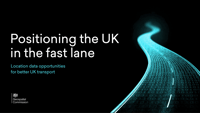RELATED NEWS

Geospatial Commission calls for evidence to identify location data opportunities
1 min read

Geospatial Commission releases report on location data ethics
2 min read

Improving public sector delivery: the role of data governance and AI integration
5 min read

New transport data strategy to unlock multiple benefits
2 min read


 "This report from the Geospatial Commission is a perfect example of the significant benefits of data in delivering tangible transport benefits, from planning where to place new electric vehicle charging points, to making last-mile journeys quicker, easier and more efficient," said Transport Minister Rachel Maclean at DfT. "This is the perfect complement to our upcoming Transport Data Strategy which will help overcome the barriers to data sharing and use, as well as improving the discoverability, accessibility and quality of data."
"This report from the Geospatial Commission is a perfect example of the significant benefits of data in delivering tangible transport benefits, from planning where to place new electric vehicle charging points, to making last-mile journeys quicker, easier and more efficient," said Transport Minister Rachel Maclean at DfT. "This is the perfect complement to our upcoming Transport Data Strategy which will help overcome the barriers to data sharing and use, as well as improving the discoverability, accessibility and quality of data."
